
Is this the shakeout of electric projects, which is the natural way of things for new technologies? thought Tecnam's explanation was refreshing, "The proliferation of aircraft with 'new' batteries would lead to unrealistic mission profiles that would quickly degrade after a few weeks of operation, making the all-electric passenger aircraft a mere 'green transition flagship' rather than a real player in the decarbonisation of aviation." What Tecnam has indicated is that the battery capacity / health would limit the practical economics of the airplane that it would become nothing more than a greenwashed hangar queen. Perhaps what they did not say was that the project was worth the exploratory investment but not millions in real development. The money is better spent elsewhere.
In NASA's case, the X-57 Maxwell was intended to investigate efficiencies in using twelve electric power units to blow air across a high-aspect low-drag wing. The idea was that all of the motors would be used for take-off, then the propellers feathered for cruise flight. The energy source was to be batteries. NASA did not offer much detail on why they determined the project was unflyable, just that certain subsystems lacked maturity and would not be ready in the time allotted to finish the $87 million programme. That seems like plenty of cash spent on an experimental programme, but then NASA admitted it had significant cost overruns. The theoretical idea was higher cruise efficiency and exchange for the mechanical chaos of 12 engines. Perhaps the money was well spent on pure research and of course it is an X-plane.
I think what we are seeing is that conventional aircraft converted to electric propulsion are problematical at best, unlikely at worst. They are too heavy, too draggy and given current battery energy density, just will not have practical payload.
هذه القصة مأخوذة من طبعة July 2023 من Future Flight.
ابدأ النسخة التجريبية المجانية من Magzter GOLD لمدة 7 أيام للوصول إلى آلاف القصص المتميزة المنسقة وأكثر من 9,000 مجلة وصحيفة.
بالفعل مشترك ? تسجيل الدخول
هذه القصة مأخوذة من طبعة July 2023 من Future Flight.
ابدأ النسخة التجريبية المجانية من Magzter GOLD لمدة 7 أيام للوصول إلى آلاف القصص المتميزة المنسقة وأكثر من 9,000 مجلة وصحيفة.
بالفعل مشترك? تسجيل الدخول

Sustainability and connectivity: top of the agenda for private jet industry
The executive aviation industry is currently facing a paradox. On the one hand, demand for private flying remains strong, propelled by the rise in the number of high-net-worth individuals around the globe. While on the other hand, the industry is increasingly being questioned by the public, the media, and politicians over its environmental credentials.

NASA, ESA join forces to land European Rover on Mars
The space agencies signed a new agreement that will see NASA supply heating units for the Rosalind Franklin rover, which could launch as soon as 2028.
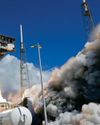
Long-awaited Starliner launch breaks a six-decade drought
An Atlas rocket has launched with astronauts aboard for the first time since Gordon Cooper's final Mercury flight in his Faith 7 capsule on 15 May 1963, powered by an Atlas LV-3B 130-D. The Atlas V rocket that launched on 5 June, manufactured by United Launch Alliance and powered at liftoff by a Russian-built RD-180 first-stage engine, carried Boeing's Starliner crew ferry ship to orbit following multiple launch delays over the past several days.

Non-CO2 emissions measured in commercial aircraft 100% SAF test
Results from the world's first in-flight study of the impact of using 100% sustainable aviation fuel (SAF) on both engines of a commercial aircraft show a reduction in soot particles and formation of contrail ice crystals compared to using conventional Jet A-1 fuel.
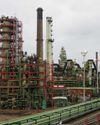
Avfuel, Neste sign SAF supply increase extension
Avfuel and renewable fuel producer Neste have finalised an extension to their agreement regarding the supply of sustainable aviation fuel (SAF) and set a framework for the deal through 2027.
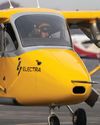
First flight for Electra hybrid 'blown lift' aircraft
Electra's blown-lift design uses eight electric motors to increase wing lift, allowing the eSTOL aircraft to take-off and land in just one-tenth of the space needed by conventional aircraft.
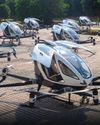
Saudi Arabia's groundbreaking air taxi trial set to transform Hajj travel for pilgrims
In a historic move, Saudi Arabia has successfully conducted its first air taxi trial in Mecca, setting the stage for deployment in the coming years and transforming Hajj transportation for pilgrims.
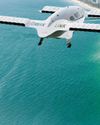
Lilium, French Government in 'advanced' talks for eVTOL jet manufacturing hub
The German manufacturer says it is in ‘advanced discussions’ with the French government to add a high-volume aircraft production facility in France, citing it as an attractive market for its flagship Lilium Jet. The company plans for the aircraft to enter service in 2026.
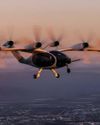
Joby partners with Mukamalah Aviation
Last month Joby Aviation announced it has signed a Memorandum of Understanding (MoU) with Mukamalah, a wholly owned subsidiary of Saudi Aramco, the operator of the world's largest fleet of corporate aircraft, to introduce Joby's aircraft to the Kingdom of Saudi Arabia.
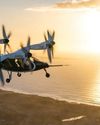
Joby acquires autonomous flight developer Xwing
Joby Aviation is one of many electric vertical take-off and landinng (eVTOL) air tax manufacturers that predicts autonomy will be the driver of ubiquitity for advanced air mobility (AAM) services and the company is placing its money where its mouth is.